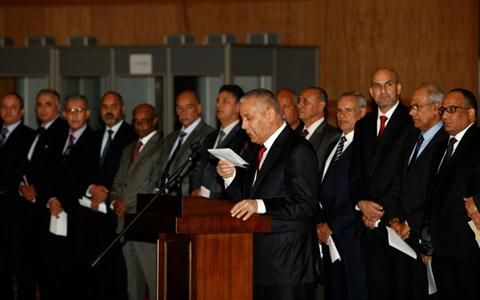By George Grant.

London, 16 November:
The process by which officials are vetted by the Integrity Commission for public office in Libya is . . .[restrict]“fraught with problems” and “far too broad and vague”, a leading rights organisation has said.
The damning critique by Human Rights Watch follows the Integrity Commission’s announcement that four ministers in Ali Zeidan’s new government had failed to meet its required criteria, whilst four more remained under investigation.
The four ministers to have been disbarred were Interior Minister Ashour Suleiman Shuwail, Electricity Minister Ali Mohammed Muhairiq, Higher Education Minister Abdulasalm Bashir Duabi and Congressional Affairs Minister Muaz Fathi Al-Khoja.
To date, the detail of the Integrity Commission’s rulings has not been made public.
The Integrity Commission was established on 4 April 2012 by Regulation No 26 of the National Transitional Council and is mandated to investigate any person seeking high political office for ties with the Qaddafi regime or evidence of criminal wrongdoing.
In addition to having had to join the revolution before 20 March 2011, under no circumstances may people in the following categories, among others, hold public office in Libya according to the Regulation:
- Members or commanders of the Revolutionary Guards;
- Members of the Revolutionary Committees;
- Student association directors after 1976;
- Those who were “known for glorifying the regime of Muammar Qaddafi or his call for the ideas of the Green Book [Qaddafi’s political philosophy], whether through various media or public speeches;”
- Those who “stood against the February 17 Revolution” by means of incitement, aid, or collusion;
- Those who were convicted of corruption or stealing public funds;
- Those who participated in any capacity in the imprisonment and torture of Libyans during the rule of the former regime;
- Those who committed or participated in hostile acts against Libyans in the opposition, whether abroad or in Libya;
- Those who seized private property or participated in seizing property during the previous regime;
- Those who were involved in stealing public funds or enriched themselves on behalf of the Libyan population, or who accumulated wealth in Libya or abroad in an illegal manner;
- Those who had commercial dealings with the sons of Muammar Qaddafi or his close associates;
- Those who formerly held positions of leadership that directly related to the sons of Muammar Qaddafi, and their institutions;
- Recipients of awards or money from the former regime by illegal means;
- Those who obtained an academic degree on a subject related to the Qaddafi’s Green Book or Third Universal Theory.
These criteria, say Human Rights Watch, are “far too broad and vague and should be limited to concrete and provable claims of wrongdoing, rather than poorly defined connections with the previous government”. The rights group added that any vetting process that absented the need for such hard facts “opens the door for political manipulation”.
Human Rights Watch also criticised the lack of opportunity given to accused individuals to respond prior to the announcement of a ruling by the Commission:
“All disqualified ministers should be presented with concrete evidence of their alleged Qaddafi ties and allowed to rebut the charges”, the group said.
“Yes, there is an appeal process, but in the Libyan court of public opinion rejected individuals have been effectively declared guilty – that’s both unfair and dangerous.”
This criticism has been publicly aired by some of the rejected ministers themselves. Last night, Ali Zeidan’s proposed interior minister Ashour Suleiman Shuwail went on television to bitterly complain that he had not been confronted by the Integrity Commission about the charges against him before it made its ruling.
Shuwail also queried whether the Commission had rigorously double-checked every piece of evidence it had found against him, arguing that large quantities of false information are circulated about public officials in Libya, much of it on authentic-looking documents.
However, there are many in Libya who believe that the Integrity Commission fulfills an important function under challenging circumstances.
“The problem we have in Libya is a lack of time and lack of functioning institutions”, said one senior political analyst in Tripoli. “Often, we know a person to be guilty of something, but there isn’t enough evidence to stand up in a court of law. Libya is not yet at the stage where evidence can always be gathered to a sufficiently high standard, but that doesn’t mean they don’t know what actually went on”.
It is not known whether the evidence compiled against the four rejected ministers would stand up in a court of law or not, but a large number of previous rulings by the Commission have subsequently been thrown out on appeal. Every rejected candidate has the right to go to a court of appeal within 10 days of a decision, and a judge must issue a final ruling within 21 days of an appeal being filed.
There are presently 12 members on the Integrity Commission, chaired by Hilal Izzedine Sanusi, a former political prisoner and president of the First Court in Marj. Eight of the members have legal backgrounds and degrees in law, whilst the remaining four includes three academics and a businessman. [/restrict]









